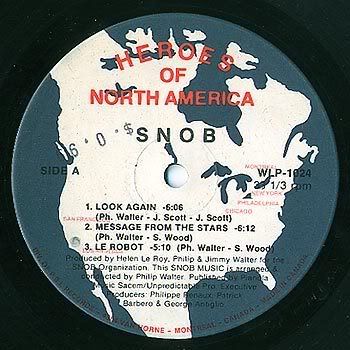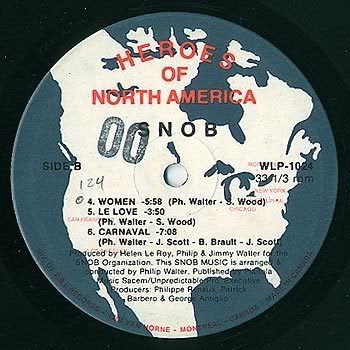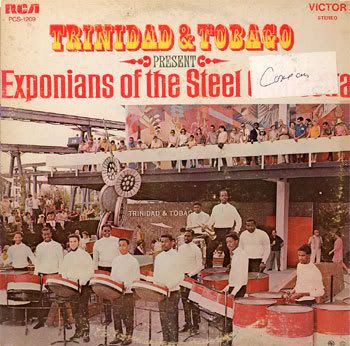
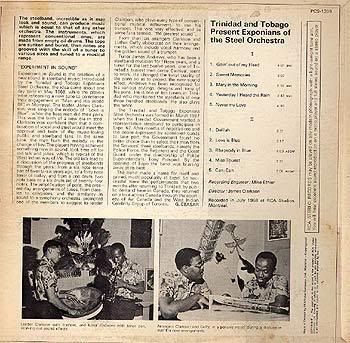
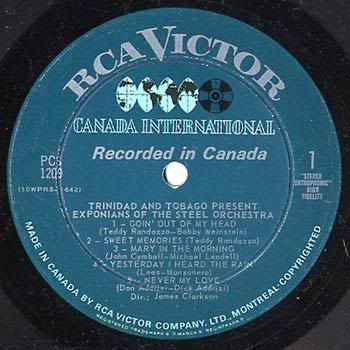

• Exponians of the Steel Orchestra -
Trinidad & Tobago Present... - LP
• RCA Victor, 1968, PCS-1209
• Directed by James Clarkson
• Engineered by Mike Ethier
• A1 Goin' Out Of My Head (♫)
• A2 Sweet Memories
• A3 Mary In the Morning
• A4 Yesterday I Heard the Rain
• A5 Never My Love (♫)
• B1 Delilah (♫)
• B2 Love is Blue
• B3 Rhapsody in Blue (♫)
• B4 Miss Tourist
• B5 Can-Can
"The steelband, incredible as it may look and sound, can produce music which is equal to that of any other orchestra. The instruments, which represent conventional ones, are made from empty oil drums. The tops are sunken and burnt, then notes are grooved with the skill of a tuner to various sizes and tuned to a musical range."
So start the liner notes of this fantastic steel-drum orchestra album. They go on to explain that the Exponians of the Steel Orchestra were formed in March of 1967 by the Trinidad Government in order to represent the country at Expo '67, happening in Montréal at the time. The Exponians were such a big hit over at the fair that they were asked to come back for a return engagement at Man and His World in May of 1968. They ended-up embarking on a cross-Canada tour sponsored by Air Canada and the West Indian Celebrity Group of Toronto. They also stopped by the RCA Studios in Montréal long enough to cut two sides of steel-drum heat, culled strategically from a western "Pops" repertoire (the one exception being Miss Tourist, a Lord Kitchener Calypso hit of the same year).
It was while preparing for their '68 gig that the Exponians crafted an "experiment in sound" which led to this album's signature: a complete range of steel-drums augmented by a curiously snappy drummer, an occasional wordless chorus and band leader James Clarkson's trumpet. "This was very effective, and as some fans termed, 'the greatest sound'", claim the liner notes. Despite some very minor reservations, mostly to do with the recording's mix (the trumpet is somewhat too "front" for my taste), I'm inclined to agree.
The album opens with a cover of Little Anthony and the Imperials' Goin' Out Of My Head (♫), a song that was getting a lot of airplay in 1968 due The Lettermen coupling it with Can't Take My Eyes Off of You all the way up the charts that year. The Exponians' version is astounding. The steel drums provide a beautifully lush bed for the trumpet's suitably languid melody while the drum kit gets a somewhat square but undeniably punchy workout.
Andy Williams' Sweet Memories gets an up-tempo Calypso rub on the next cut, and it also introduces one of the orchestra's most interesting devices, namely singing the chorus in key-words-only unison ("Swee-eet Memories...La La La La La La La La La Laaaaaa"), something that I've grown quite fond of. Mary in the Morning is next, a nice ballad. The smoothness continues with the fourth cut, Tony Bennett's Yesterday I Heard the Rain, notable for some of the Bach-like elements of the arrangements.
Never My Love (♫) is the last cut on side 1 and undoubtedly the album's highlight. Already a killer tune by The Association, The Exponians manage to outshine the original in sheer vitality and inventiveness. Yes, it's the return of that snappy drummer, his square sense of rythm somehow going so far out that it boomerangs back into decidedly funky territory. And when the men hit full choral mode by tune's end, you will've never seen your fore-arm hairs stand at such attention.
Side 2 starts with a full-steam-ahead Calypso armoured tank-with-no-brakes bang. Tom Jones' murder-serenade Delilah (♫) turns into a maniacal Caribbean freak-out in the Exponians' hands. It's absolutely unrecognisable until the trumpet melody comes in, and even then its frantic pace is dizzying. Trumpeter and band leader James Clarkson even has time to throw in a torreador-suited solo.
Love is Blue is a far prettier version of the Paul Mauriat orchestral easy-listening number that must have been piped into every public restroom in North-America at the time. It's a notable entry due to the absence of the trumpet. Gershwin's Rhapsody in Blue (♫) follows, exposing the steel-drum's versatile dynamic range. The ebb and flow of the steel-drum swells at the beginning of the song is spell-binding in that "exotica" sort of way. And when the intended jazz portion of the song hits, your neck'll be poppin' to those syncopations.
Lord Kitchener's calypso song Miss Tourist gets a pleasant straight steel-drums-only versioning. It's interesting to see how percussive Kitch's original melody lines were, as you can really imagine him singing those staccatto steel-drum leads. The album closes with what must have been quite the crowd-pleasing number over at the old Expo grounds, namely a version of that French Can-Can song. It comes off on the wrong side of gimmicky, despite it being requisitely lively. I've never been partial to that tune, so it could just be me.
As a fan of both Expo '67 and steel bands, I couldn't quite believe it when I yanked this number free from the Sally Ann bins. But with their "experiment in sound," the Exponians have totally surpassed my already high expectations. Hope you dig the tunes.



